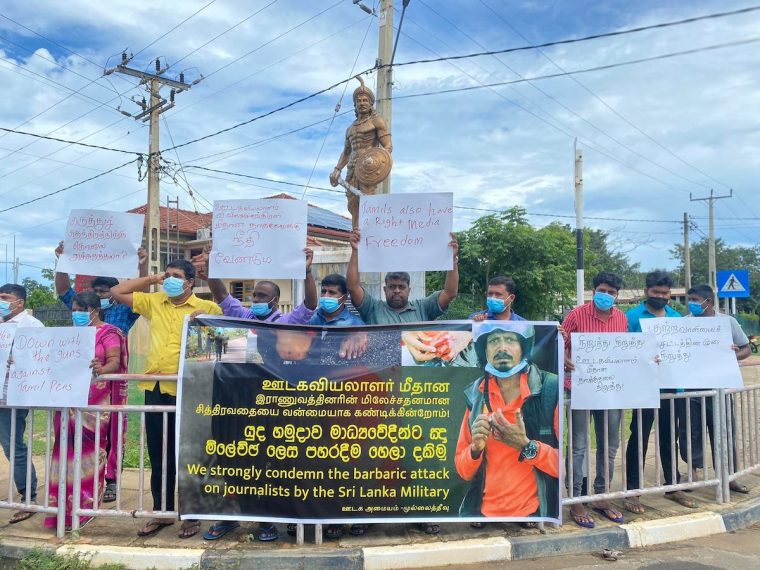Washington, D.C., December 2, 2021 — Sri Lanka authorities must immediately open a new, impartial investigation into the attack on freelance journalist Vishwalingam Vishwachandran and hold the perpetrators to account, the Committee to Protect Journalists said today.
On November 27, a group of soldiers with the Sri Lanka army allegedly beat Vishwachandran, who contributes to ethnic Tamil publications, with a palm stick wrapped in barbed wire while he was covering a commemoration for Sri Lanka’s civil war dead in the northern Mullaitivu district, according to a statement by an advocacy group run by exiled journalists Journalists for Democracy in Sri Lanka; a statement by the Federation of Media Employees Trade Unions, a local network of trade unions for working journalists and media workers; a statement by the Mullaitivu Press Club; and a person familiar with the case, who spoke with CPJ on the condition of anonymity due to fear of reprisal by authorities.
After the Mullaitivu Press Club led protests demanding that authorities take urgent action against the accused, officers with the Sri Lanka military police brought three army soldiers to the Mullaitivu police station on November 28 and accompanied them until their release on police bail, according to news reports and the person familiar with the case. That person said authorities did not bring the accused before a magistrate, as usually required by law, and have not filed a formal report against the accused as of today.
On November 30, the Sri Lanka army released a statement denying the attack against Vishwachandran, claiming that its investigation found that the journalist fell backwards over his own motorcycle onto a barbed wire fence before lying on the ground to “pose for visuals for stage-managed filming.”
The statement also alleged that the medical examination report from the local hospital where Vishwachandran had received treatment following the attack showed that the journalist had been treated only for “abrasion” and “contusion.” Publishing the details of Vishwachandran’s medical examination report constitutes a breach of confidentiality under Sri Lankan law, according to a tweet by Ambika Satkunanathan, a human rights lawyer and former Commissioner of the Human Rights Commission in Sri Lanka.
“The Sri Lanka army’s denial of its soldiers’ brutal beating of Vishwalingam Vishwachandran is a brazen and shameful attack on press freedom in a country where Tamil journalists continue to face constant harassment for doing their jobs,” said Steven Butler, CPJ’s Asia program coordinator, in Washington, D.C. “Authorities must swiftly open a new impartial investigation into the incident and hold the perpetrators to account while protecting Vishwachandran’s safety and confidentiality in the process.”
A group of army soldiers allegedly attacked Vishwachandran while he was photographing the roadside Mullivaikkal name board, seized his phone and camera, and damaged his motorcycle, according to the statement by the Federation of Media Employees Trade Unions and the statement by the Mullaitivu Press Club. Nearly 50,000 Tamils were subjected to mass killings in the final stages of Sri Lanka’s decades-long civil war in the Mullivaikkal area of the Mullaitivu district. Ethnic tensions persist between the Tamils and the Sinhalese communities, the country’s majority ethnic group and leaders of its ruling Sri Lankan People’s Front party, after the civil war ended in 2009.
Vishwachandran suffered serious injuries to his stomach, arms, and legs and was admitted to a local hospital for treatment, according to the Mullaitivu Press Club’s statement.
Vishwachandran contributes to the privately owned news websites Lankasri and Tamilwin, according to the person familiar with the case, citing information received from the Mullaitivu Press Club. He also serves as treasurer of the Mullaitivu Press Club, according to the statement by the Federation of Media Employees Trade Unions.
CPJ emailed the media department of the Sri Lanka army and Mullaitivu’sSecurity Forces Headquarters, the regional command of the Sri Lanka army, for comment but did not receive any reply. The officer-in-charge of the Mullaitivu police station did not respond to CPJ’s request for comment sent via messaging app.
CPJ has recently documented other cases of Sri Lanka police interrogating and harassing Tamil journalists.
Editors’ Note: The second paragraph has been updated to reflect the correct description of Journalists for Democracy in Sri Lanka, and the fifth paragraph has been updated to link to a tweet about Sri Lankan law.
